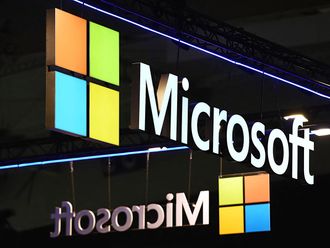Dubai
Tablet market has overtaken the PC market in the UAE for the first time in the second quarter by more than 6,700 units as end users maintain their shift toward mobile devices, according to International Data Corporation (IDC) findings.
During the quarter, the UAE PC market suffered around 20 per cent fall to 412,741 units compared to 515,430 units during the same period last year.
In the tablet space, the market grew by 24 per cent to 419,505 units compared to 338,190 units in the same period last year, fuelled by growth in consumer segment and Android operating system.
“People are spending more time on smartphones and tablets than PCs and are shifting their spending accordingly as well. Also, a much smaller portion of the UAE PC market now accounts for re-exports, compared to the same quarter last year,” Fouad R. Charakla, research manager for personal computing, systems, and infrastructure solutions at International Data Corporation, told Gulf News in an exclusive interview.
Among the Gulf countries, Bahrain witnessed the steepest fall of around 21 per cent year on year, followed by the UAE, while Qatar and Oman fell by around three per cent.
Saudi Arabia witnessed a growth of around seven per cent and Kuwait grew by two per cent.
Mini-notebooks or netbooks have reached their end-of-life in the entire Middle East and Africa (MEA) region after being active in the computing industry for almost seven years.
“Consumer segment got impacted due to re-exports which happens to the Iraq market. On the commercial segment, we are doing good business,” said Rajat Rallan, senior brand merchandising manager for Dell Middle East, Turkey and Africa.
He said there will be growth in the tablet space but not as big as registered in certain markets over the last couple of years.
Entry-level tablets have registered “big growth compared to premium tablets.”
Dell will be launching new tablets at Gitex running on Android.
Windows contribute around three per cent to Dell’s total sales.
“There are quite a few projects for Windows tablets on the table from the commercial sector within the next month. Our strategy is to offer mid-range tablets with better specs and for value for money, much more than our competitors,” Rallan said.
Charakla said that desktops grew in the UAE in the second quarter due to refreshment cycles from the commercial sector. In the UAE, Qatar and Saudi Arabia, more than 50 per cent of the PC demand comes from home users. Laptops contribute around 75 per cent to the total PC sales in the UAE.
The discontinuation of support from Microsoft for its Windows XP operating system forced some organisations to upgrade the OS while others opted to replace their PCs altogether, which positively impacted commercial demand.
Emerging products such as All-in-Ones share in the desktop category grew, accounting for almost 20 per cent of total desktop sales while share of ultra-slim notebooks doubled to more than 25 per cent of the laptop sales this quarter compared to 13 per cent in the same period last year.
“Convertible notebooks are not doing brisk sales as most of the available models in the market are still quite expensive. At the same time, convertible notebooks are also facing tough competition from two-in-one tablets, which are performing better,” Charakla said.
The PC market is expected to further decline in the third quarter compared to a year ago but it will show a growth compared to the previous quarter due to Gitex Shopper.
Rallan said there are projects which are getting finalised in the UAE. They will bring in a much bigger number on the notebook side in the third quarter.












